Review from Fiscal 2017 to Now
Aim to achieve sustainable growth built upon former investment and growth
2017-2019
-
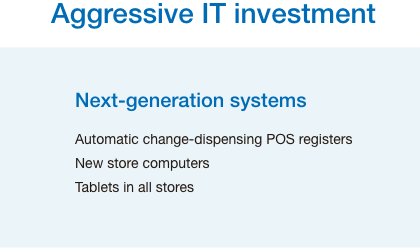
-
In the years leading up to fiscal 2019, the Company made continuous efforts to counter the shortage in labor due to the decline in Japan’s working population resulting from a falling birthrate and aging population, while at the same time working to provide more services to meet customer demand. We took steps to strengthen our merchandising and store capabilities, utilizing the semi-automatic ordering system introduced in 2015 to increase ordering accuracy and reduce ordering workload, while increasing the height of display shelving in stores to increase the number of products on display from 3,000 to 3,500.
At the same time, we made proactive investments in IT with a view to making store operations even more efficient. In 2017, we introduced tablets to manage store work schedules, creating an environment where store crews can work uniformly. We completed installation of POS cash registers with automatic change dispensers at all stores by 2019 and implemented measures to enable cash registers to be operated easily by non-Japanese or new store crew members. In addition, to meet the demands of night-time customers, we reviewed the delivery schedule to three times a day in order to strengthen our product lineups.
2020-
-
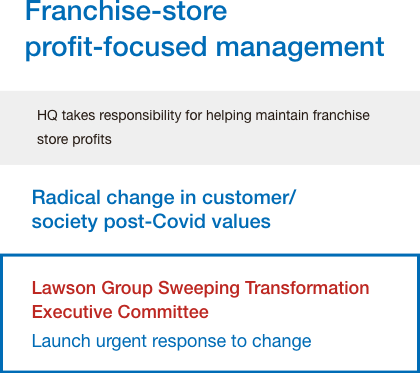
-
In fiscal 2020, we expected to see the effects of our previous measures and IT investments, based on franchise store profit-focused management. However, the effects were difficult to measure as the business environment was dramatically altered by the impact of the COVID-19 pandemic. In particular, after the state of emergency was declared in April 2020, sales decreased and we were required to attend urgently to finding solutions for the issues of securing an environment where franchise stores could operate safely under the COVID-19 pandemic, and on recovering their sales. We took concrete measures to prepare the operating environment, including implementing rigorous infection prevention measures at stores and quickly providing support from headquarters for stores experiencing low earnings.
In addition, as customers lifestyles changed, demand increased for five categories of products: fresh food, frozen food, daily foods, Japanese and Western sweets, and alcohol; and we strengthened our product lineups accordingly in an effort to restore sales. These efforts enabled franchise stores to maintain profit levels with the previous fiscal year, despite the pandemic. Furthermore, in a bid to achieve growth in this new business environment, in September we established the Lawson Group Sweeping Transformation Executive Committee and started initiatives to realize growth strategies for the entire Group.
2021-2025
-
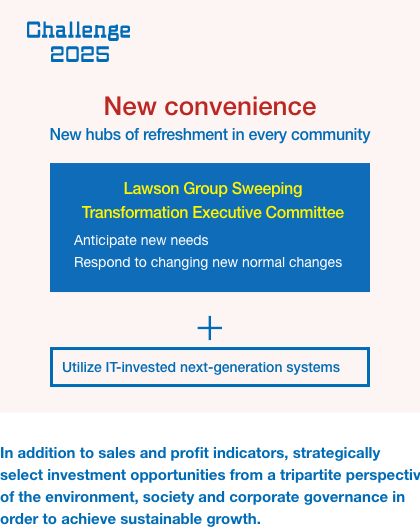
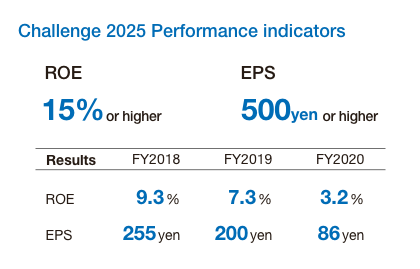
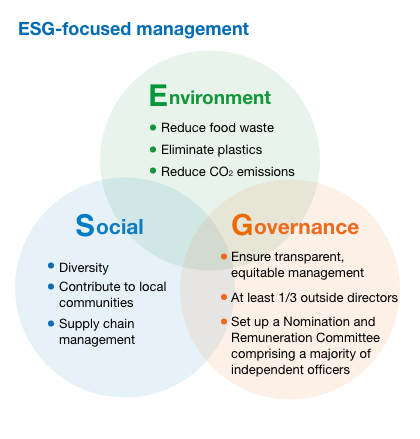
-
Pursuing new ways to provide convenience with
“New hubs of refreshment in every community”
We have formulated Challenge 2025, targeting our 50th founding anniversary in 2025. Under Challenge 2025, we aim to realize the Group philosophy, “Creating Happiness and Harmony in Our Communities” by becoming the No. 1 recommended store for our customers, communities, and colleagues and creating “New hubs of refreshment in every community,” as we pursue new ways to provide convenience. In our pursuit of new ways to provide convenience, we established the Lawson Group Sweeping Transformation Executive Committee in September 2020, and we have launched a range of initiatives to fulfill our business policy comprising three promises: “Superior taste,” “Human Kindness” and “Environmental (Machi) friendliness.” The committee is made up of 12 projects and decarbonization, and it is chaired by the president himself to enhance its agility and promote rigorous progress management on milestones established for each project. The overall projects are categorized into four themes, namely “transforming store displays,” “transforming profit structures,” “operating companies,” and “transforming work motivation.” The main projects for each theme are as follows. “Transforming store displays” includes the ideal store format project for realizing merchandize assortments that correspond to customers’ lifestyle changes and convenient methods of selling, as well as the product renewal project, which aims to provide frozen foods and daily food items that offer greater value and ease of use. “Transforming profit structures” includes the vendor distribution project, which aims to optimize supply chains, as well as the unified use of Group data project, which aims to create earnings opportunities by unifying customer data from Group companies and using it for marketing. “Operating companies” include the individual operating companies project, which will work to achieve sustainable growth of operating companies; while “Transforming work motivation” includes the work motivation reform project which seeks to foster job satisfaction among employees, who are an important foundation of the business.
In addition to these initiatives, under Challenge 2025 we will also strategically select investment targets from the three perspectives of environment, society, and corporate governance, aiming to achieve sustainable growth for the entire Lawson Group. For 2025, we are aiming to achieve ROE of 15% or more and EPS of 500 yen or more.





